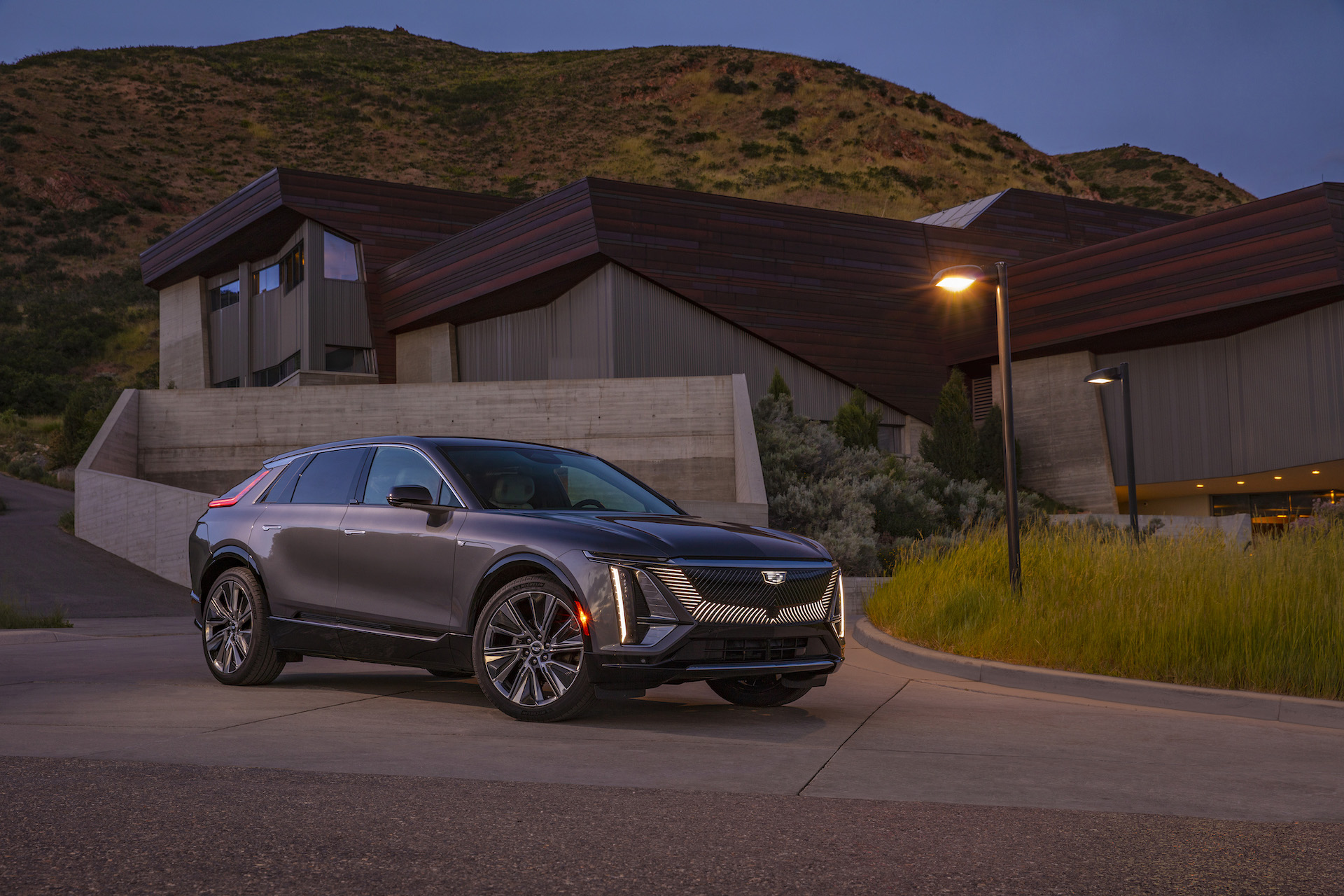
—with additional reporting by Bengt Halvorson
Cadillac’s first battery-electric vehicle has landed—and for GM’s luxury brand, it arrives not a moment too soon.
Built in Spring Hill, Tennessee, with packs from a nearby battery plant built with LG, the Lyriq charts the course for Cadillac’s future portfolio of electric vehicles. Its rivals include the upcoming Mercedes-Benz EQS SUV and BMW iX, the Rivian R1S, and the extant Jaguar I-Pace and Audi E-Tron.
With the 2023 Lyriq, Cadillac taps the same Ultium battery technology as the Hummer EV to fashion a new beginning: By the end of this decade, Cadillac will be an electric brand, whether it figures out how to retain some of the dealers it’s already lost or how to thrive without them.
2023 Cadillac Lyriq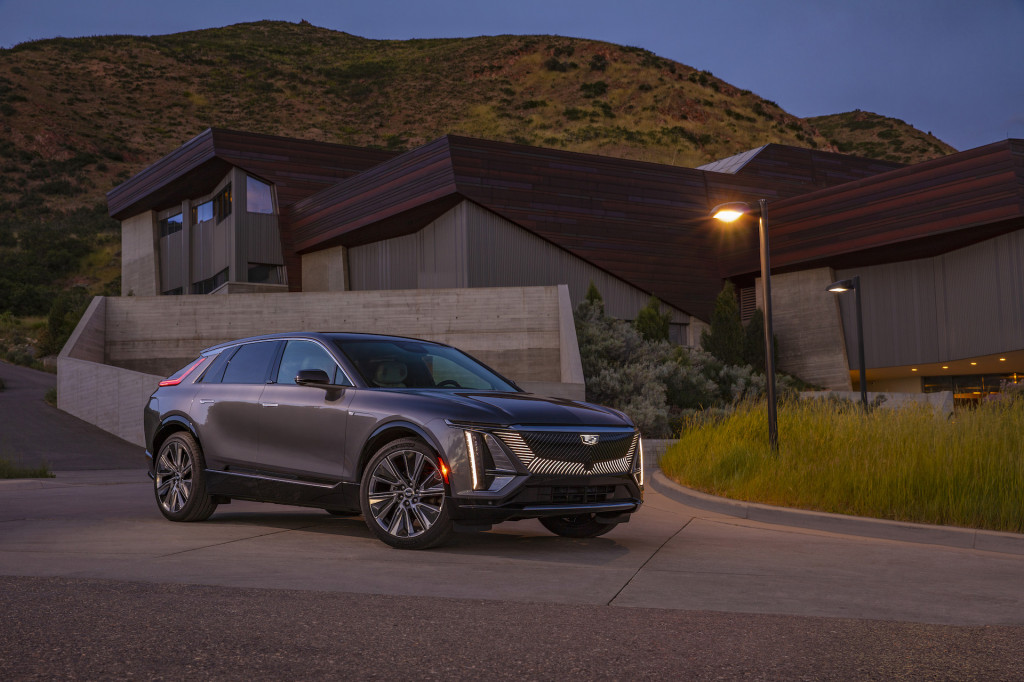
The stunning shape of the Lyriq wraps a detailed cabin that’s broad, comfortable, and distinctive.
It launches its new era with a fashionable jolt. The Lyriq has a long nose, a stubby tail, a front end festooned with laser-drawn diagonal lighting, and a stance that still echoes that of an ICE-powered vehicle. In this case, familiarity breeds comfort; the Lyriq doesn’t get too avant-garde ahead of itself. The front-end design will lead its first wave of EVs, Cadillac designer Andrew Smith has told Green Car Reports, with “choreographed” lighting that shifts its patterns as drivers approach or walk away.
The Lyriq’s unusual door handles signal more change: tap them and they protrude, but front passengers must then grab a black plastic flag to open and enter a cockpit polished to a lush, technical gloss. The Lyriq’s super-wide 33-inch LED display can toggle between displays ranging from efficiency to mapping, can mirror wide-screen version of Apple CarPlay or can output its native Google-based infotainment, and can do it all via touches and swipes, voice commands, or a gem-like rotary controller on the center console. Retro metallic joysticks direct the air through a band of slim vents while power-seat controls sit on the door panels, a la Mercedes-Benz.
2023 Cadillac Lyriq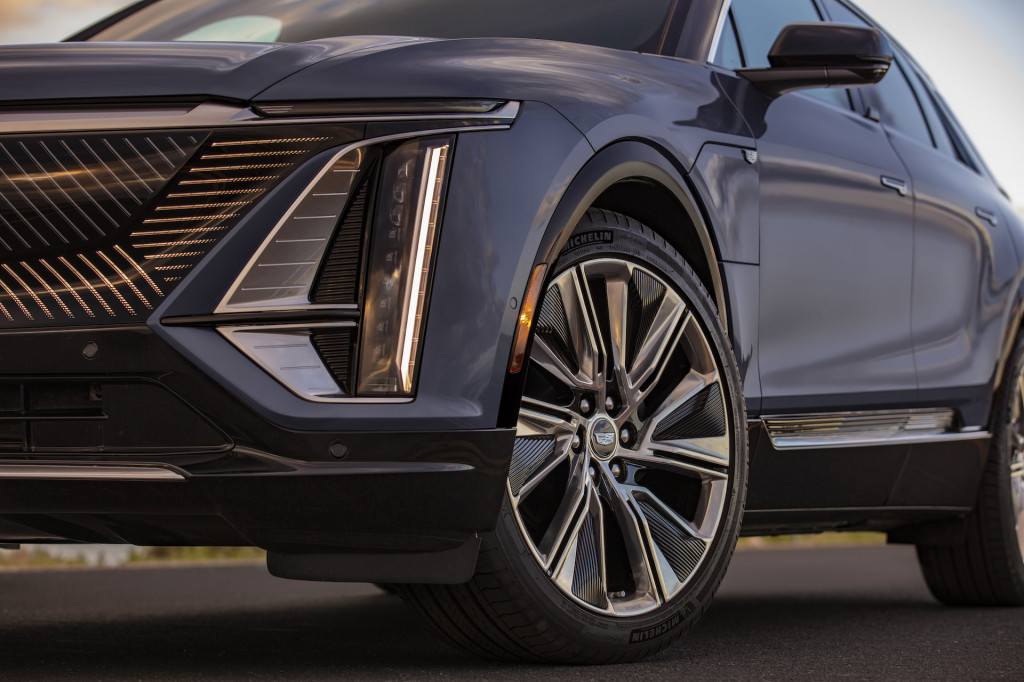
The Lyriq’s single-layer, 102-kwh battery pack shares tech with the Hummer EV.
2023 Cadillac Lyriq: a single-layered performance
Though it’s developed off the same battery architecture as the GMC Hummer EV, the Lyriq’s single-layer battery pack transforms it into a distant relative—one that’s sleeker to be sure, but also lighter and more efficient.
Light? Well, no. The Lyriq weighs at least 5,610 lb. But its 102-kwh, 12-module battery pack—which shares the large-format NCMA lithium-ion pouch cells as those used in the GMC Hummer EV—sits lower in its single battery stack, while still delivering 340 hp and 325 lb-ft of torque through its rear permanent-magnet motor and low 11.63:1 reduction gear. Cadillac predicts 312 miles of driving range from this initial iteration of the Lyriq, though EPA ratings haven’t been confirmed. The twin-motor version promises more than 500 hp, but won’t begin production until later this year.
As it stands, the Lyriq takes the tack of electric cars like the EQS and E-Tron, not the Plaids. Shift its old-school column-mounted lever into Drive and it accelerates strongly, with an estimated 0-60 mph time of well under six seconds. Cadillac’s scorching gas-engine Blackwings may have the drop on it, but this will be the least intense flavor of Ultium-powered Lyriqs, and it’s still deeply satisfying.
2023 Cadillac Lyriq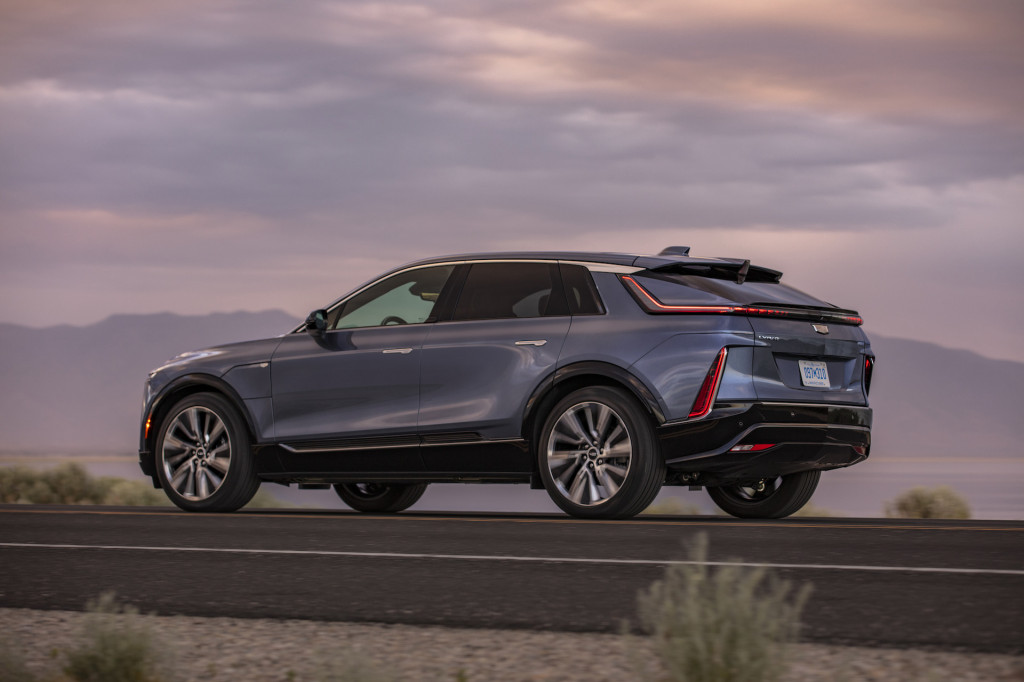
The Lyriq’s heady acceleration gets outpointed by some quicker rivals, but few have its ride composure.
Blessed with very good straight-line performance, the Lyriq’s best performance trait wells up from its five-link suspension and passive dampers that eschew complicated air springs and adaptive setups for an absorbent ride even when the standard 20-inch wheels have been upgraded to the available 22-inch set. Cadillac credits a set of twin-tube dampers that give the Lyriq its ability to rush over road imperfections like a skier leaping moguls, without spending more on an extravagant setup that adds weight and saps battery charge. It’s a choice that pays off with graceful composure, no matter what the surface.
Lyriq drivers will notice some overbaking, maybe, in the SUV’s drive modes. The stock Tour mode can be spun into a Sport setting which loads up the steering with additional weight—but can’t do much about the car’s wheelbase, track, or weight. The Lyriq’s low-speed responses should be quicker: it can take a 180-degree turn at the wheel to navigate a low-speed hairpin turn. Four-wheel steering would help, too.
At the same time, Cadillac enables one-pedal driving through the same multi-tap procedure via the Lyriq’s touchscreen, when a toggle on the dash would be more effective. Three one-pedal modes mimic a range of behaviors, from a low-regen simulated coasting effect, to a strong regen mode that triggers up to 0.3g of force. There’s also a left-side paddle on the steering column for additional input: it’s pressure-sensitive, not mode-triggering, so you can forget the ELR (or any tie to a Chevy Bolt EV) before you even remember it. Cadillac programs these settings to persist when the car’s turned off—and it’s blended in the regenerative braking with smooth friction brakes for a seamless slowdown experience.
2023 Cadillac Lyriq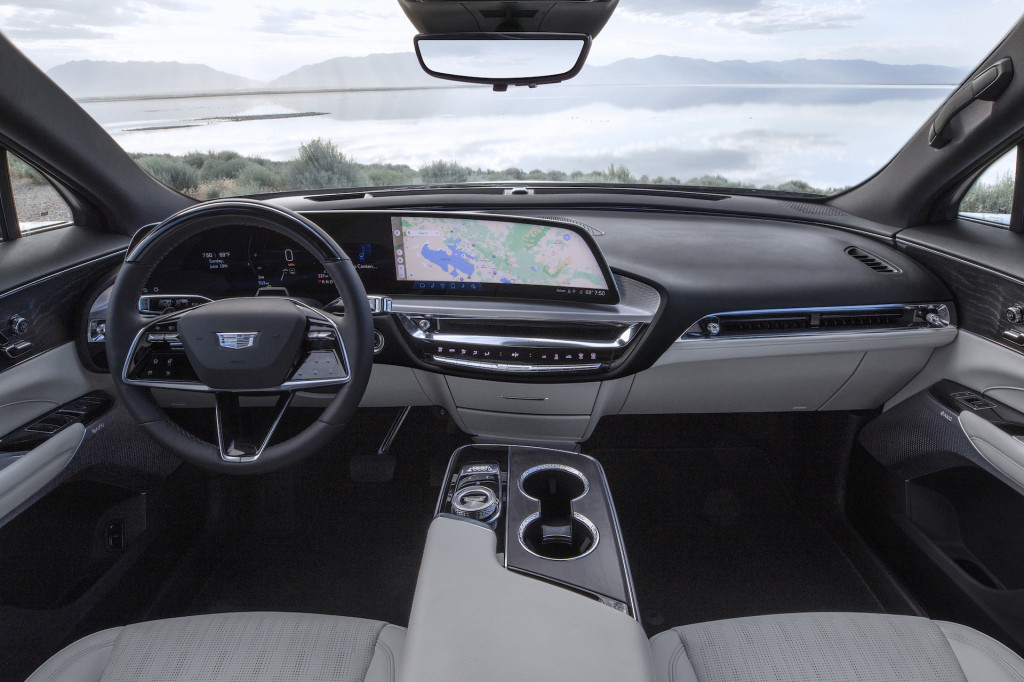
The Lyriq’s unusual door handles stay close to the body, while front passengers pull on tabs to enter.
2023 Lyriq: Space race
To convince ICE drivers that nothing gets lost in the battery translation, the Lyriq takes on a big outline and extracts lots of interior volume from it. On its 121.8-inch wheelbase, and within its 196.7-inch footprint, the Model X-sized Lyriq can carry five adults in its synthetic leather seats. In front, power-adjustable buckets sit amid the low dash and slim console surrounded by a vast expanse of space. The airy feel of the cabin doesn’t call back overtly to the past, save for a joystick air blender here and an emblem there. Even in its graphic displays the Lyriq bends the arc of history forward, not backward.
Still, with its heft and overall size, the Lyriq seats four at best. The back-seat middle passenger perches on a slim cushion with an oddly protruding fold-down armrest that nudges between their shoulder blades, and their feet must splay to span the wide center console. Head and leg room pose few problems, and the Lyriq’s nearly full-length glass roof drenches the cabin in light—or holds up departures, since closing its enormous fabric shade can take a good 20 seconds.
2023 Cadillac Lyriq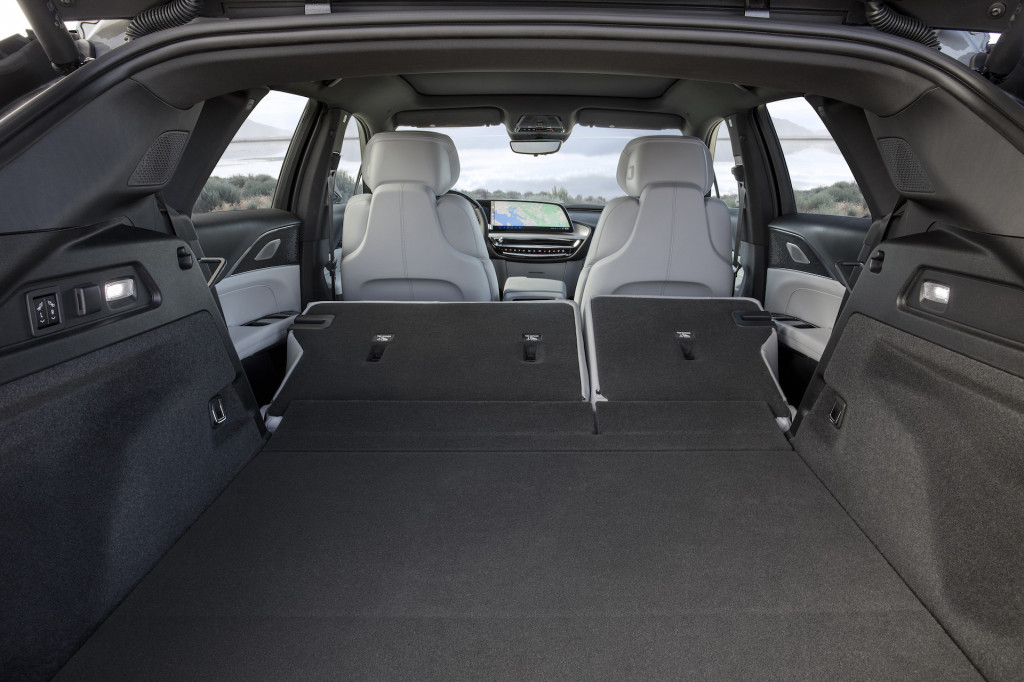
There’s no frunk, but the Lyriq’s deep storage well under its cargo floor carries charging cables and much, much more.
The Lyriq omits the kitschy and functional frunk, leaving a shroud to cover the place where a second motor will live. But it makes up for that with an expansive 28.0-cubic-foot cargo hold, endowed with a deep bin under its floor for charging cables and fold-down rear seats that create a total storage volume of 60.8 cubic feet.
It’s not plush, by traditional luxury standards, but the Lyriq has a serene cabin filled with user-selectable shades of ambient light. Versions with the upgraded 19-speaker AKG audio system—all 2023s will have it—also get active noise cancellation that counterpunches tire sizzle and ambient road noise with opposing frequencies to generate a synthetic, calming quiet.
GM’s latest infotainment and safety technology have been baked into the Lyriq, with available hands-free Super Cruise staring at the driver through a column-mounted camera and a new Google-derived operating system governing its big 33-inch curved OLED screen. The system decoupled from Bluetooth-connected phones a few times, but it has its charms—like a configurable screen that permits drivers to easily drop a favorite for drive modes on the home screen, or switch the gauge layout for a spare speedometer or a navigation pane.
2023 Cadillac Lyriq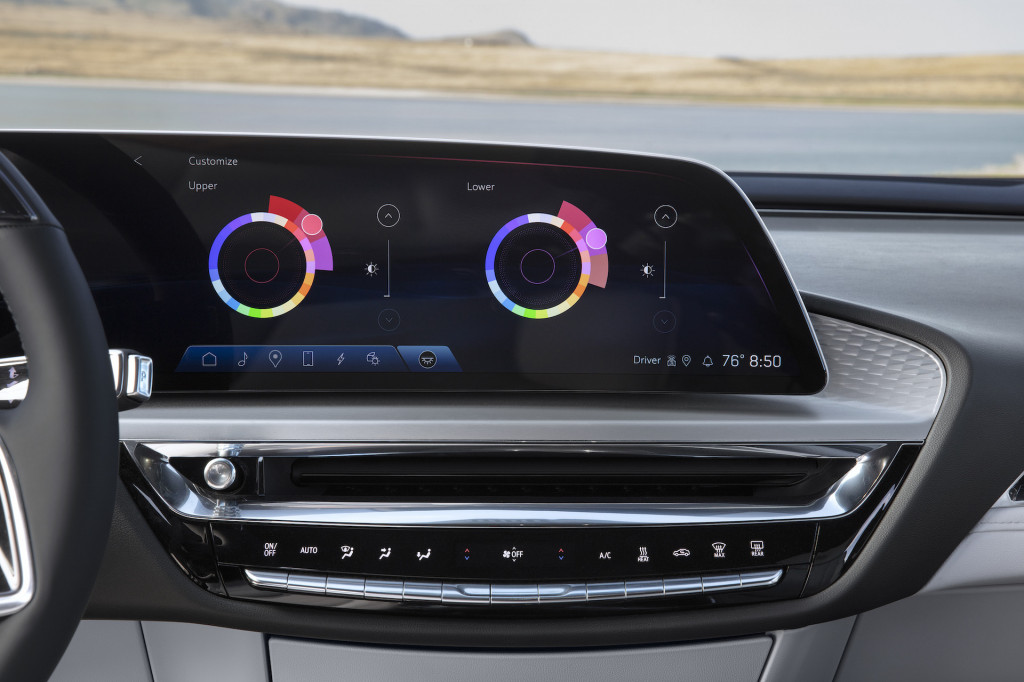
The Lyriq’s immersive 33-inch display toggles from navigation to efficiency screens, with native infotainment based on Google code.
2023 Lyriq: Taking charge
Cadillac expects most Lyriq drivers will charge their vehicles at home. For those owners, the installation of a 100-amp circuit will help extract 80 amps from a wallbox and make the most of the 19.2-kw onboard charger. It’s a setup that, to be realistic, many won’t be able to support at home, although it nets a $1,500 credit from the automaker and the potential to pump 51 miles of range into the car per hour.
If you’re not graced with the electrical service to support that, at 11.5 kw (think 60-amp circuit, and what matches up with the max of many Tesla vehicles), the onboard charger will recover up to 31 miles of range per hour. On a DC fast-charging setup Cadillac ups that to 76 miles in 10 minutes, or up to 196 miles in a half-hour.
2023 Cadillac Lyriq at EVgo DC fast-charging station.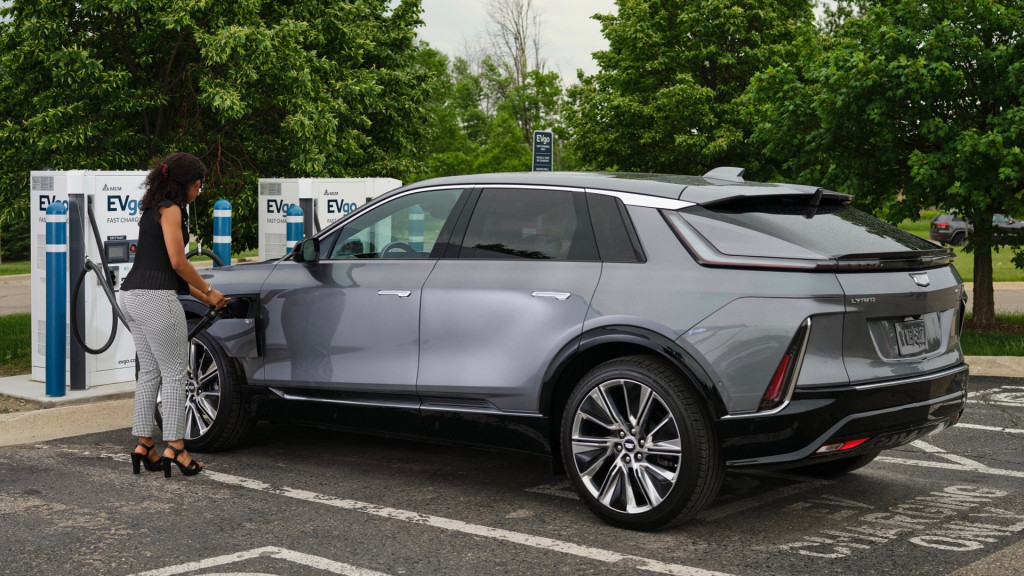
At launch, Plug and Charge functionality will not be activated, but Cadillac expects to have it live by early fall. The company has connected with a half-dozen charging station service providers for access to more than 60,000 Level 2 and DC fast-charging stations across the country. If they don’t use the $1,500 credit for a Qmerit home setup, owners can apply that toward EVgo fast-charging station use.
The first Lyriq SUVs will be charging at stations soon. Cadillac has begun production and will deliver its first battery-electric cars in the coming weeks. But if you don’t have a reservation, you’ll have to skip ahead to the 2024 model year. Cadillac initially had priced the 2023 Lyriq at $59,990 for a limited run of about 1,500 first-year cars, with remaining 2023s stickered at $62,990 for rear-drive versions and $64,990 for all-wheel drive. All those have been sold: order books now closed for 2023 will reopen in the fall for 2024, with a significant jump in price.
Our sister site, The Car Connection, rates the 2023 Lyriq at 8.8 out of 10, thanks to strong scores in efficiency, comfort, and features. It’s a bridge to a new generation of vehicles that promise plenty for a struggling brand that still defines itself with Blackwing V-8 power and the heady fumes of the past.The Lyriq tosses that rulebook, and sets out the rules for an entirely new game, full of risk.
_______________
Cadillac provided transportation and accommodations so that we could bring you this first drive review.
